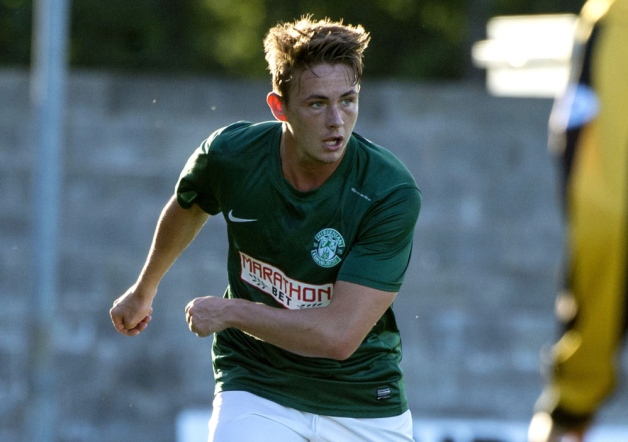Scott Allan was just three-years-old when diagnosed with type 1 diabetes, but the 23-year-old is now playing for one of the biggest football clubs in Scotland.
The Hibernian midfielder has been a first-team regular this season and performs at his optimum levels by keeping his blood sugar levels lower before games.
Scott sat down with Diabetes.co.uk and discussed how he controls his diabetes for matches, the way his management has changed since becoming a professional footballer and the state of diabetes awareness in the UK.
Q. What was playing football like growing up with type 1 diabetes?
“I started off playing football with my friends. I never really had any problems until I got to a professional level and I had to monitor everything more closely. I had to find a medication routine when I was around about 12 years old, which was when I was playing at specific times. I used to have a little bar of chocolate before I played so my blood sugar didn’t drop. As I got older, I started playing at a much higher intensity – when I started playing at professional level I had to fine tune things to get the best out of my performance.”
Q. How has your medication routine changed over the years?
“I stopped taking chocolate bars before games – whenever I was running around the pitch later in games it would cause me to cramp because my blood sugar was going too high. For me, it’s about having a blood sugar of between 4-6 mmol/l. My ideal number before playing would be 5 mmol/l. I also take insulin, without sugar, to compensate for the adrenaline rush and playing in front of the fans, which would normally cause my blood sugar to spike without me even having sugar.”
Q. What are the biggest challenges of playing football with diabetes?
“It’s not really been that challenging for me in terms of having hypos, the issue for me has always been keeping my blood sugar under 10 mmol/l for a full 90 minutes. If I went high it would cause me to feel fatigued early on, which doesn’t benefit me or the team. So on a match day, I strive to be as perfect as possible.”
Q. Do you think diabetes awareness needs to be increased in the UK?
“I think more needs to be done. I always need to explain exactly how my diabetes is managed. A lot of people think that diabetes is a set way for somebody, but everyone is different and their bodies act differently. Other sportspeople need to be high before they exercise, but I need to run lower otherwise I’ll spike. Some people find that really hard to believe.”
Q. What would you tell young children with diabetes looking to pursue a career in sport?
“As I’ve gotten older, I’ve tried to show young players that you can go and play. It’s about showing that as long as you manage your diabetes you can do whatever you want. You need to live as much of a normal life as possible, don’t let people tell you otherwise. There have been a lot of athletes throughout the years that have been at the top of the game with diabetes. I went to school with a lot of other diabetics and they used to think they were really hard done by. That used to get on my nerves because I just wanted to play football. I was just always telling everyone that if you manage it then you’ll be fine.”
Q. What is the most annoying misconception about diabetes?
“A lot of people think that you can’t touch any foods with sugar in, or have a drink. People will tell you: ‘Oh, you can’t have that.’ But as long as you cover it, you can basically eat anything you choose.”
For more information, you can check out our Diabetes and Sport section for information on managing diabetes during sport.
Picture credit: www.edinburghnews.scotsman.com





